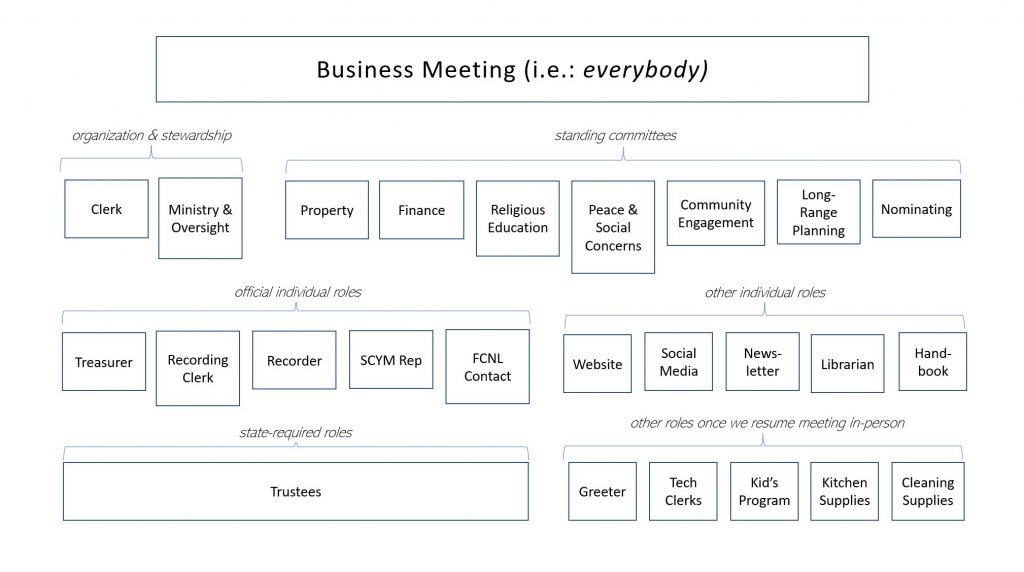To some people, the term “organized Quakers” seems an oxymoron. We have no pastors. No one seems to lead our Meetings for Worship. Nobody asks for money and we don’t pass a collection basket. How do we keep Meeting running?
We do, in fact, have a structure. Expressed graphically, it looks like this:

Not quite your ordinary org. chart, is it?
Our monthly Meeting for Worship with Attention to Business is in charge. Everyone has a voice, because everyone has insight and access to the truth. The goal is to do what is best for the good of the meeting. This isn’t a matter of balancing what different people want. It’s a matter of discerning the true way forward. Clerk helps the Business Meeting come to clarity about that way. (For further reading, see Michael J. Sheeran: Beyond Majority Rule: Voteless Decisions in the Religious Society of Friends and Debbie Humphries: Four Pillars of Meeting for Business.)
Here are short descriptions of some of the major roles.
(We will add more as time permits.)
The Clerk oversees the ongoing activities and business of the Monthly Meeting. This includes: clerking (facilitating) Meeting for Worship and memorial services, weddings, etc.; presiding at Business Meetings to facilitate the Meeting’s group effort to discern and respond to the leading of the Spirit; keeping track of Meeting correspondence; serving as the main contact person about day-to-day Meeting business; and serving as principal representative of the Meeting to outside groups.
The Ministry and Care Committee (formerly “Ministry and Oversight”) is charged with fostering and strengthening the spiritual growth of Meeting for Worship, and of the individuals in the Meeting, encouraging varying gifts for ministry and service, exercising care of the membership, and providing guidance for the corporate life of the Meeting. It provides both leadership and pastoral care.
The Property Committee maintains and cares for the Meetinghouse building and grounds and recommends desirable improvements, maintaining and enhancing the beauty, utility and simplicity of the Meetinghouse environment.
The Finance Committee oversees the financial affairs and assets of the Meeting in accordance with Friends’ principles and practices.
The Religious Education Committee provides opportunities to children and adults of our Meeting community for spiritual growth through knowledge of the history and experience of the Religious Society of Friends, of the Christian faith and its literature, through knowledge of other faiths, through understanding oneself and others in all one’s relationships, and through practicing Quakerism as a way of everyday life. This includes managing our Children’s Program and contributing to our Forums.
The Peace and Social Concerns Committee gives consideration and focus to the peace and service concerns of the Monthly Meeting. This includes sponsoring educational forums, engaging in joint activities with outside groups in service to the San Antonio community, and maintaining contact with groups to which the Meeting gives financial support. The committees activities depend in large part on its members’ interests.
The Community Engagement Committee manages several aspects of “in-reach” and “outreach” for the Meeting. These include come of the outreach tasks listed under “other individual roles” in the above chart. They also include the in-reach tasks that will make our Meetings for Worship thrive once we are again able to meet in person. Recent practice has allowed individuals or small groups to take responsibility for specific tasks without attending formal committee meetings. (This sort-of works, so long as there is some way to coordinate.)
The Long-Range Planning Committee considers future development of the Meetinghouse property, including all buildings and grounds.
The Nominating Committee helps Friends and attenders find ways to use their skills to enhance Meeting life, generally but not exclusively for positions like those listed above. They work to ensure that all may have an opportunity for the growth which comes with Meeting service.
To learn more, here is a link to Part 3 of our Meeting Handbook. That the section on Organizations & Procedures. It has information about several of the other roles listed in the chart above. It’s a guide, not a straightjacket; in practice, we’re reasonably informal. But the Handbook is a pretty good guide to how we (ideally) operate.
We always need help!
If you see a job you’d like to do,
or would like to explore using your skills
— for small tasks or large ones —
please talk with the Clerk or with
the Nominating Committee.
clerk (at) saquakers.org
nominating (at) saquakers.org
